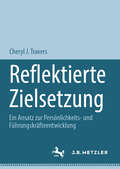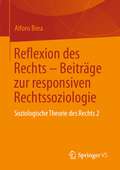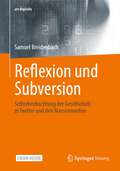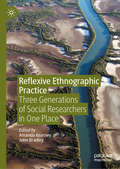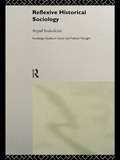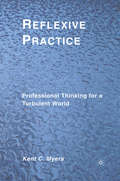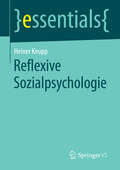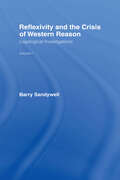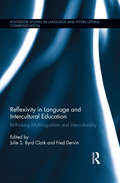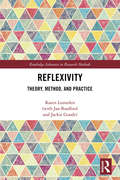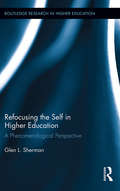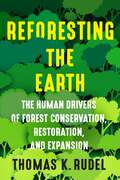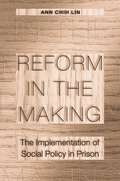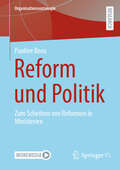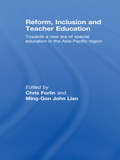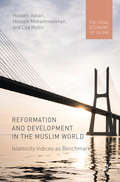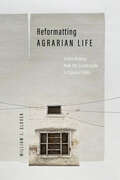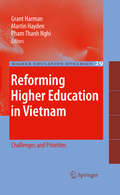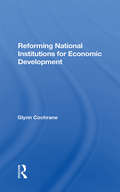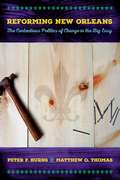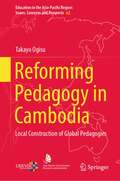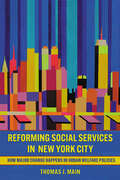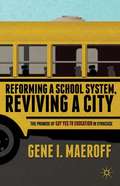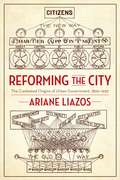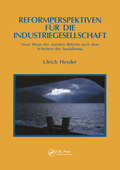- Table View
- List View
Reflektierte Zielsetzung: Ein Ansatz zur Persönlichkeits- und Führungskräfteentwicklung
by Cheryl J. TraversDieses Buch präsentiert erstmals einen umfassenden Überblick über das Modell des "Reflective Goal Setting", seinen theoretischen Rahmen und Ursprung sowie seine praktischen Anwendungen für die persönliche Entwicklung, verbesserte Bewältigung und Stressreduktion, akademisches Wachstum und Leistungsfähigkeit sowie Führung. In drei Teile gegliedert, untersucht die Autorin zunächst die besondere Bedeutung der persönlichen Entwicklung, insbesondere der Entwicklung von Soft Skills und zwischenmenschlichen Fähigkeiten. Unter Verwendung von Originalforschung und anschaulichen Fallstudien beschreibt die Autorin den zyklischen Fünf-Schritte-Prozess des "Reflective Goal Setting" in fünf Kapiteln, die Teil 2 des Buches bilden. Teil 3 untersucht die praktischen Anwendungen und Auswirkungen der Verwendung von "Reflective Goal Setting" anhand anschaulicher Fallstudien aus verschiedenen Bereichen, einschließlich Hochschulbildung, beruflicher Entwicklung und Führungskräfteentwicklung. Dieses Werk ist eine wertvolle Ressource für Forscher:innen und Praktiker:innen in den Bereichen Organisations- und Industriepsychologie, Bildung sowie Wirtschaft und Management sein - und für jede/n, der/die an der persönlichen Entwicklung arbeiten möchte.Die Übersetzung wurde mit Hilfe von künstlicher Intelligenz durchgeführt. Eine anschließende menschliche Überarbeitung erfolgte vor allem in Bezug auf den Inhalt.
Reflexion des Rechts – Beiträge zur responsiven Rechtssoziologie: Soziologische Theorie des Rechts 2
by Alfons BoraDieses Buch versammelt Überlegungen zur Rechtssoziologie und zur soziologischen Rechtstheorie. Einzelstudien auf verschiedenen rechtssoziologischen Forschungsgebieten verdeutlichen die Möglichkeiten einer responsiven soziologischen Theorie des Rechts. Diese greift rechtstheoretische Fragen auf und macht sie soziologisch relevant. Die soziologische Theorie des Rechts verkörpert so die interdisziplinäre Integration von Autonomie und Praxis.
Reflexion und Subversion: Selbstbeobachtung der Gesellschaft in Twitter und den Massenmedien (ars digitalis)
by Samuel BreidenbachDie ehemals den Massenmedien vorbehaltene Funktion, die Gesellschaft zu reflektieren und diese gesellschaftlichen Selbstbeschreibungen auch gesellschaftsweit bekannt zu machen, kann heute auch von Social-Media-Plattformen erfüllt werden, wenn die Nutzer*innen dort die Gesellschaft beschreiben und diese Beiträge massenhaft verbreitet werden. Gleichzeitig unterscheiden sich die in den Social Media verbreiteten Gesellschaftsbeschreibungen enorm von jenen herkömmlicher Massenmedien – nicht zuletzt aufgrund der technischen Infrastrukturen der Plattformen. Aus Perspektive der sozialen Systemtheorie werden am Beispiel von Twitter Gemeinsamkeiten und Differenzen zwischen diesen beiden Formen gesellschaftlicher Selbstreflexion herausgearbeitet. Vor allem aber soll die Analyse die grundsätzlich divergenten Wirkungen aufzeigen, welche die (Selbst-)Reflexion der Gesellschaft nach sich ziehen kann, wenn diese einerseits gesellschaftliche Komplexität als einheitliche Realität greifbar macht und damit der Selbstvergewisserung dient, andererseits genauso die Kritik und das Hinterfragen des Bestehenden erlaubt.
Reflexive Ethnographic Practice: Three Generations of Social Researchers in One Place
by John Bradley Amanda KearneyPutting the anthropological imagination under the spotlight, this book represents the experience of three generations of researchers, each of whom have long collaborated with the same Indigenous community over the course of their careers. In the context of a remote Indigenous Australian community in northern Australia, these researchers—anthropologists, an archeologist, a literary scholar, and an artist—encounter reflexivity and ethnographic practice through deeply personal and professionally revealing accounts of anthropological consciousness, relational encounters, and knowledge sharing. In six discrete chapters, the authors reveal the complexities that run through these relationships, considering how any one of us builds knowledge, shares knowledge, how we encounter different and new knowledge, and how well we are positioned to understand the lived experiences of others, whilst making ourselves fully available to personal change. At its core, this anthology is a meditation on learning and friendship across cultures.
Reflexive Historical Sociology (Routledge Studies in Social and Political Thought #Vol. 22)
by Arpad SzakolczaiThis book reconstructs and brings together the work of a number of social and political theorists in order to gain new insight on the emergence and character of modern Western society. It examines the intersection point of social theory and historical sociology in a new theoretical approach called "reflexive historical sociology". There is analysis of the works of Max Weber, Michel Foucault, Norbert Elias, Eric Voegelin and a number of others. The book is divided into three parts. Part 1 examines the works of Eric Voegelin, Norbert Elias, Lewis Mumford and Franz Borkenau. Part 2 is concerned with the major conceptual tools such as experience, liminality, process, symbolisation, figuration, order, dramatisation and reflexivity, and themes such as the history of forms of thought, subjectivity, knowledge and closed space and regulated time. Finally, the book examines the most important insights of the thinkers discussed, concerning the historical processes that led to modernity.
Reflexive Practice
by Kent C. MyersBuilding upon the work of Donald Schon, this edited collection expands the research into the idea of the reflexive practice - understanding how to create better solution-oriented practices for business during turbulent and chaotic situations.
Reflexive Sozialpsychologie: Ambivalenzen Und Potenziale Eines Neuen Altersbildes In Der Flexiblen Arbeitswelt (essentials #8)
by Heiner KeuppDie neue Arbeitswelt ist von zunehmender Unsicherheit geprägt. Diskontinuierliche Beschäftigungsverhältnisse sind weiter auf dem Vormarsch. Für die Beschäftigten in der Wissensökonomie sind damit höhere Freiheitsgrade verbunden, aber auch neue Belastungen - bis hin zum Burnout. Zudem sind Jobnomaden, Freelancer und Zeitarbeitende oft von betrieblicher Gesundheitsförderung ausgeschlossen. Wie und von wem können diese Gruppen bei der Gesundheitsprävention unterstützt werden? Der Band beleuchtet diese Fragen aus verschiedenen sozialwissenschaftlichen Perspektiven und unterfüttert die Argumentation mit empirischen Erkenntnissen.
Reflexivity And The Crisis of Western Reason: Logological Investigations: Volume One
by Barry SandywellThis ground breaking work explores the genealogical analysis of the discourses of reflection. Barry Sandywell traces the differences between the traditional discourses of reflection and the experiences of reflexivity in everyday, social and philosophical thought. Brilliantly organised and abounding with astonishing insights, Reflexivity and the Crisis of Western Reason offers a fundamental challenge to our normal ways of viewing social thought.
Reflexivity in Language and Intercultural Education: Rethinking Multilingualism and Interculturality (Routledge Studies in Language and Intercultural Communication)
by Fred Dervin Julie S. Byrd ClarkWith the impact of accelerated globalization, digital technologies, mobility, and migration, the fields of Applied Linguistics, Language, and Intercultural Education have been shifting. One shift in need of further exploration is that of systematic and coherent reflexivity in researching language and culture. This unique and timely book thus examines the significance of reflexivity as an integral process, particularly when researching the multifaceted notions of multilingualism and interculturality in education. It also contributes to current critical approaches to representations of languages and cultures in identity politics. As such, the authors offer innovative ways of engaging with reflexivity in teaching, learning, and research through multimodal and complex ways. The chapters span a diverse range of educational settings in Asia, Australia, Europe, and North America.
Reflexivity: Theory, Method, and Practice (Routledge Advances in Research Methods)
by Karen LumsdenReflexivity is valuable in social research because it draws attention to the researcher as part of the world being studied and reminds us that the individuals involved in our research are subjects, not objects. By being reflexive we acknowledge that we cannot be separated from our biographies. This volume reviews key debates concerning reflexivity in theory, methods, and practice. It mounts a defence of reflexivity against new materialist and post-qualitative critiques and the pressures exerted on scholars from the neoliberal marketized university system which privileges fast academia at the expense of slow, reflective scholarship. While defending reflexivity, this book also those identifies issues which plague mainstream sociological operationalizations of a positivistic form of reflexivity. It argues for the extension of reflexivity into domains otherwise neglected in public accounts, and a shift from reflexivity as an individualized quality of the researcher (used to judge peers and navel-gaze) to a feminist, collaborative, reflexive sensibility which is mindful of the wider contexts shaping the construction of knowledge(s), experience(s), and of the role of research communities. Providing examples of reflexivity in action from academics at different stages of their careers, Reflexivity will appeal to students and researchers interested in fields such as Sociology, Qualitative Research Methods, Criminology, Ethnography, and Ethics of Research.
Refocusing the Self in Higher Education: A Phenomenological Perspective (Routledge Research in Higher Education)
by Glen ShermanIn higher education literature, theories of learning and development have largely been adapted from psychology to the exclusion of basic insights from philosophy. This volume addresses the gaps in higher education’s theoretical base created by this inattention to philosophy and reflects on the significance of the history of philosophy for the field of higher education. Key insights from phenomenological and then deconstructive philosophy are explained in an accessible and useful way and woven into a practical theory of the student-subject and its implications for learning and development. Finally, narrative theory is introduced in conjunction with these philosophical considerations as the author considers alternative ways of conceptualizing the student, the student’s experience, and the unification of the curricular, co-curricular, and extracurricular aspects of higher education.
Reforesting the Earth: The Human Drivers of Forest Conservation, Restoration, and Expansion (Society and the Environment)
by Thomas RudelForests offer a natural solution to the climate crisis. Conserving and expanding them not only removes carbon from the atmosphere but also protects and fosters biodiversity. Yet the results of elite-driven reforestation initiatives have been disappointing, and in many world regions deforestation continues relentlessly.Thomas K. Rudel examines a wide range of conservation and reforestation efforts to shed new light on the social factors that lead to success. He details effective coalition-building strategies and organizational models that have protected, restored, and expanded forests around the world. Rudel argues that successful reforestation projects bring together diverse groups of people with a stake in the land and a commitment to collective decision making. They give voice to different economic and social interests, including small farmers, Indigenous peoples, loggers, ranchers, government officials, NGO personnel, international donors, and climate activists. These varied coalition members each make commitments to promote forests. Farmers limit the extent of lands under cultivation, governments protect land tenure for smallholders, and wealthy donors make payments for environmental protections.Timely and accessible, Reforesting the Earth offers a guide to scaling up local efforts to sequester carbon and makes a powerful case for a global reforestation movement.
Reform in the Making: The Implementation of Social Policy in Prison
by Ann Chih LinIs it time to give up on rehabilitating criminals? Record numbers of Americans are going to prison, and most of them will eventually return to society with a high chance of becoming repeat offenders. But a decision to abandon rehabilitation programs now would be premature warns Ann Chih Lin, who finds that little attention has been given to how these programs are actually implemented and why they tend to fail. In Reform in the Making, she not only supplies much-needed information on the process of program implementation but she also considers its social context, the daily realities faced by prison staff and inmates. By offering an in-depth look at common rehabilitation programs currently in operation--education, job training, and drug treatment--and examining how they are used or misused, Lin offers a practical approach to understanding their high failure rate and how the situation could be improved. Based on extensive observation and over 350 interviews with staff and prisoners in five medium-security male prisons, the book contrasts successfully implemented programs with subverted, abandoned, or neglected programs (those which staff reject or which do not teach prisoners anything useful). Lin explains that staff and prisoners have little patience with programs aimed at long-range goals when they must face the ongoing, immediate challenge of surviving prison life. Finding incentives to make both sides participate fully in rehabilitation is among the book's many contributions to improving prison policy.
Reform und Politik: Zum Scheitern von Reformen in Ministerien (Organisationssoziologie)
by Pauline BoosDiese qualitative Fallstudie nimmt den Diskurs zur Verwaltungsmodernisierung und insbesondere die Forderung einer agilen Verwaltung zum Anlass, postbürokratische Reformen in der Ministerialverwaltung in den Blick zu nehmen. Als postbürokratische Reformen werden hier intendierte Organisationsveränderungen verstanden, die das Ziel haben, Interaktionen und Dezentralisierung in der Entscheidungsfindung zu stärken und gleichzeitig Formalisierung abzubauen. Die Autorin widmet sich der Frage, wie es zum Scheitern solcher Reformen in Ministerien kommen kann. Im Zentrum der Untersuchung stehen zwei Einheiten, die in einem Ministerium mit dem Ziel seiner Modernisierung gegründet wurden. Es wird untersucht, wie sich diese Einheiten strukturell zum Rest der Organisation verhalten, inwiefern sie sich unterscheiden und welche Auswirkungen diese Unterschiede auf den Verlauf der Reorganisation haben. Die Autorin fasst die Reform als mikropolitisches Spiel und arbeitet so drei Mechanismen heraus, die zu ihrem Scheitern geführt haben. Dabei diskutiert sie das Verhältnis von Politik, Verwaltung und Reorganisation und entwickelt auf Basis dessen Handlungsempfehlungen für die Praxis.
Reform, Inclusion and Teacher Education: Towards a New Era of Special Education in the Asia-Pacific Region
by Chris Forlin Ming-Gon John LianThis ground-breaking book considers current perspectives on special education reform in the Asia-Pacific region. It has a major focus on a new era of special education, and how this relates to education reform towards inclusive education. With major changes being proposed under current educational reform and confusion as to how to instigate these measures, this book provides ways to better prepare teachers. It is helpfully divided into three different sections of education reform: "Education Reform in the Asia-Pacific region" reviews broad trends and issues in special education across the region, including Taiwan, Korea, Australia, India, China and Hong Kong. "Preparing Teachers to work in Inclusive Classrooms" focuses on curricula and pedagogical practices for teacher education. This section considers different approaches to preparing teachers such as cross-categorical, collaborative, innovations, and the impact of teachers’ attitudes, perceptions and concerns on inclusion. "Effective Special & Inclusive Practices" draws upon evidence–based research to provide best practice models to assist in developing inclusive school communities. Each section addresses a list of objectives and questions; suggests best practice pedagogy; and concludes with a support section with useful websites and suggested professional development activities. This book will interest teachers, teacher educators, university lecturers in education and post graduate students.
Reformation and Development in the Muslim World
by Hossein Askari Hossein Mohammadkhan Liza MydinThis book explores how the recent development of Muslim countries as a group has fallen far short of non-Muslim countries, which some have concluded may be a result of Islamic teachings. The authors examine Muslim countries over time, viewing their progression on the Islamicity scale. They assess why some countries have done better than others and to derive useful policy recommendations to improve political, social, human, governance and economic performance.
Reformatting Agrarian Life: Urban History from the Countryside in Colonial India (South Asia in Motion)
by William J. GloverReformatting Agrarian Life presents a stealth urban history from the countryside that foregrounds the mutual entanglements of agrarian and urban expertise. William J. Glover traces an essential genealogy for understanding how urbanism unexpectedly left the city in late colonial India and began to settle in agrarian space, exploring how two milieus that were initially seen as distinct were gradually brought together both conceptually and in practices of ordinary life. He argues that rural change and the expert knowledge associated with managing the countryside in colonial India opened paths for urban concepts and forms to permeate agrarian settings where they were previously thought to have little relevance. This process indelibly shaped idioms and modes of agrarian life, just as it gave rural problems and processes a structural role in urban discourse. By illuminating the intellectual paths by which agrarian and urban processes came to be understood as co-constituting, and exploring multiple vivid, empirically rich case studies of projects where those relations were made evident, this book presents a compelling case to move beyond traditional intellectual silos and enter new theoretical territory to understand processes of urban and rural transformation.
Reforming Higher Education in Vietnam: Challenges and Priorities (Higher Education Dynamics #29)
by Grant Harman Thanh Nghi Pham Martin HaydenVietnam is a dynamic member of the community of Southeast Asian nations. Consistent with aspirations across the region, it is seeking to develop its higher education system as rapidly as possible. Vietnam's approach stands out, however, as being extremely ambitious. Indeed, it may be at risk of attempting to do too much too quickly. By 2020, for example, Vietnam expects its higher education system to be advanced by modern standards and highly competitive in international terms. This vision faces many challenges. The economy, though growing rapidly, remains reliant on the availability of unskilled labour and the exploitation of natural resources, and decision making in many areas of public life continues to be hamstrung by a legacy of over-regulation and centralised control. A large number of goals and objectives have been set for reform of the higher education system by 2020. The success of these reforms will have a major bearing on the future quality of the system. This sober assessment Vietnam's global competitiveness forms a backdrop to the subject matter of this book, that is, the state of Vietnam's higher education system. The book provides a comprehensive and scholarly review of various dimensions of the higher education system in Vietnam, including its recent history, its structure and governance, its teaching and learning culture, its research and research commercialisation environment, its socio-economic impact, its strategic planning processes, its progress with quality accreditation, and its experience of internationalisation and privatisation.
Reforming National Institutions For Economic Development
by Glynn CochraneIn this book, Dr. Cochrane presents various case studies of institutional reform and discusses how the reforms worked in practice. Through an examination of the budgeting process in Zambia, the public service in PapuaNew Guinea, agricultural programs in Sierra Leone, and rural development in Brazil, he draws lessons and indicates guidelines for institutional reform in developing countries.
Reforming New Orleans: The Contentious Politics of Change in the Big Easy
by Peter F. Burns Matthew O. ThomasHurricane Katrina devastated New Orleans in 2005, but in the subsequent ten years, the city has demonstrated both remarkable resilience and frustrating stagnation. In Reforming New Orleans, Peter F. Burns and Matthew O. Thomas chart the city's recovery and assess how successfully officials at the local, state, and federal levels transformed the Big Easy in the wake of disaster. Focusing on reforms in four key sectors of urban governance--economic development, education, housing, and law enforcement--both before and after Katrina, they find lessons for cities hit by sudden shocks, such as natural disasters or large-scale financial crises. One of their key insights is that post-disaster recovery tends to limit local control. State and federal officials, national foundations, and local actors excluded by pre-Katrina politics used their resources and authority to displace entrenched local interests and implement a public agenda focused on institutional and governmental change. Burns and Thomas also make clear reform in New Orleans was already underway before Katrina hit, but that it had focused largely on upper- and middle-class residents, a trend that accelerated after the storm. The market-centered nature of the reforms have ensured that they largely benefited city and regional elites while not significantly aiding the city's working-class and impoverished populations. Thus reform has come at a cost and that cost, in the long term, could undermine the political gains of the post-Katrina era.
Reforming Pedagogy in Cambodia: Local Construction of Global Pedagogies (Education in the Asia-Pacific Region: Issues, Concerns and Prospects #62)
by Takayo OgisuThis book presents a sociocultural account of logic, or a pedagogy, that governs Cambodian education, from policy-making to classroom practices. In so doing, it seeks to not only provide an introduction to Cambodian education, but also to help readers understand the complexities involved in reforming educational practices by drawing on an ethnographic multi-level case study of an ongoing pedagogical reform policy. The book reveals what is actually taking place in today’s Cambodian classrooms and how actors view their own practices in response to the new pedagogy. Importantly, the book situates Cambodian pedagogical reform efforts amid the global wave of student-centered pedagogies and sheds new light on the political economy of educational policy-making and policy implementation along a global-local axis.
Reforming Social Services in New York City: How Major Change Happens in Urban Welfare Policies
by Thomas J. MainReforming Social Services in New York City examines efforts across six decades to respond to poverty, joblessness, and homelessness through the establishment and periodic restructuring of the city's Human Resources Administration (HRA) and related social welfare agencies.As Thomas J. Main shows through archival research and interviews with key figures, the HRA has been the focus of several mayoralties. The John Lindsay administration's creation of the HRA in 1966 was a classic liberal effort to fight poverty; Rudy Giuliani brought dramatic change by implementing work-oriented welfare reform; and the Bill de Blasio administration attempted to install a progressive social welfare agenda within the city's social service agencies to reduce inequality. Reforming Social Services in New York City tells the story of these efforts, assessing the strategies employed and the success of their outcomes, concluding that major nonincremental change in urban welfare policy is not only possible but has been effective.
Reforming a School System, Reviving a City: The Promise of Say Yes to Education in Syracuse
by Gene I. MaeroffCan a bold investment in education turn around the economy of an entire city? Gene I. Maeroff, former national education correspondent for the New York Times , explores how the nonprofit group Say Yes to Education has instituted a network of reforms in Syracuse, New York, that aim to expand the city's the middle class by supporting its children.
Reforming the City: The Contested Origins of Urban Government, 1890–1930
by Ariane LiazosMost American cities are now administered by appointed city managers and governed by councils chosen in nonpartisan, at-large elections. In the early twentieth century, many urban reformers claimed these structures would make city government more responsive to the popular will. But on the whole, the effects of these reforms have been to make citizens less likely to vote in local elections and local governments less representative of their constituents. How and why did this happen?Ariane Liazos examines the urban reform movement that swept through the country in the early twentieth century and its unintended consequences. Reformers hoped to make cities simultaneously more efficient and more democratic, broadening the scope of what local government should do for residents while also reconsidering how citizens should participate in their governance. However, they increasingly focused on efficiency, appealing to business groups and compromising to avoid controversial and divisive topics, including the voting rights of African Americans and women. Liazos weaves together wide-ranging nationwide analysis with in-depth case studies. She offers nuanced accounts of reform in five cities; details the activities of the National Municipal League, made up of prominent national reformers and political scientists; and analyzes quantitative data on changes in the structures of government in over three hundred cities. Reforming the City is an important study for American history and political development, with powerful insights into the relationships between scholarship and reform and between the structures of city government and urban democracy.
Reformperspektiven Fur Die Industriegesellschaft
by Ulrich HeyderFirst Published in 1995. This book takes a fresh look at the problems of political planning in Western societies. Klaus Lompe. Dieses Buch fuhrt zu einem grudsatzlick neuen Blick auf die Probleme der politischen Planung in westlichen Gesellschaften. Klaus Lompe.
